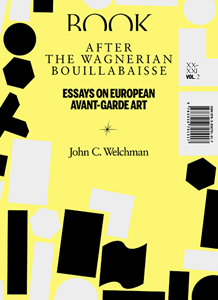Borrowing its title from Tristan Tzara's description of the Gesamtkunstwerk, John C. Welchman's compelling study begins with a reassessment of Italian
Futurism and the unique and disruptively consequential compounding of words and images in
Dada and
Surrealism. Other chapters cover the production, and circumvention, of affect in the work of Henri Matisse and Fernand Léger; the delirious splits and metaphorical ricochets fired up by
Salvador Dalí; and the social and philosophical ideas mobilized by
René Magritte. The second half of the volume examines mid- and late-twentieth century artists, comprising a revisionist assessment of
Hans Hartung; an analysis of the “turbulent” abstraction of Antoni Tàpies; a deliberation on “whiteness” in the practice and thinking of
Günter Brus; and an exploration of postwar exchanges between the United States and the United Kingdom about sculpture. The book concludes with an essay on the relations between writing and seeing in the work of Swiss artist
Rémy Zaugg.
John C. Welchman is a professor at the Department of Visual art of University of California, San Diego. His works focuses on modern and contemporary art history and critical theory. His numerous publications include a monograph on
Mike Kelley, of which he has also edited the
collected writings (MIT Press, Les presses du réel / JRP|Ringier).

